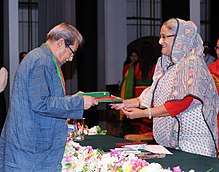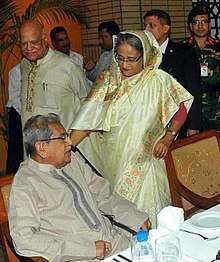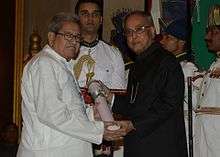Anisuzzaman
| Anisuzzaman | |
|---|---|
.jpg) Anisuzzaman in 2016 | |
| Born |
18 February 1937 Calcutta, Bengal Presidency, British India |
| Nationality | Bangladeshi |
| Alma mater | University of Dhaka |
| Occupation | Activist, author, administrator |
| Relatives | Sheikh Abdur Rahim (grandfather) |
| Awards | full list |
Anisuzzaman (born 18 February 1937)[1][2] is a Bangladeshi academic of Bengali literature. He was an activist who took part in the Language Movement (1952), participated in Mass Uprising (1969), and took part in the War of Liberation (1971). He was a member of the Planning Commission to the Government of Bangladesh during the Bangladesh liberation war and a member of the National Education Commission set up by the government after liberation. He was inducted as a National Professor by the Government of Bangladesh in 2018.[3]
Early life and education
Anisuzzaman was born in Calcutta in 1937. Along with his family, he moved to Khulna after the 1947 partition. After about a year they moved to Dhaka.[4] His father ATM Moazzem was a homeopathy practitioner and his grandfather, Sheikh Abdur Rahim, was a journalist and writer.[5] His first piece of writing, a story, was published in Nowbahar, a literary magazine, in 1950. He completed his HSC from Jagannath College.[6] He obtained his bachelor's in 1956 and master's in 1957 in Bengali from the University of Dhaka. At the university, he worked with Muhammad Shahidullah, Muhammad Abdul Hye and Munier Chowdhury.[4] He completed his Ph.D. in 1962 at the age of 25 form the same university.[6] He was a post-doctoral fellow at the University of Chicago during 1964–65 and a Commonwealth Academic Staff fellow at the University of London (1974–75).
Career

Anisuzzaman served as a faculty member at the University of Dhaka during 1959-69, 1985-2003 and 2005-08. He taught Bengali at the University of Chittagong during 1969-85.[5] From 1978 to 1983, he was associated with research projects of the United Nations University. He was a visiting fellow at the University of Paris (1994), North Carolina State University (1995) and University of Calcutta (2010), and a visiting professor at the Visva-Bharati (2008–09, 2011).[6]
Anisuzzaman was a member of the Planning Commission to the Government of Bangladesh during the Bangladesh liberation war and a member of the National Education Commission set up by the government after liberation. He was responsible for the Bengali language part of the Constitution of Bangladesh adopted on November 1972.[7] He served as Chairman of the Trustee Board of the Nazrul Institute and has been the president of the Bangla Academy since 2011.[6]
Activism
Anisuzzaman took part in the Language Movement (1952), participated in Mass Uprising (1969), took part in the War of Liberation (1971) and was the secretary of the Bangladesh Teachers' Association in 1971. He was involved in the anti-autocracy movement (1990).
In 2015, Anisuzzaman received death threats from Islamic extremists.[8]
Literary works

- Muslim Manos O Bangla Sahitya (1964)[9]
- Munir Chowdhury (1975)
- Swaruper Sandhane (1976)[5]
- Adharo Sotoker Bangla Cithi (1983)
- Purono Bangla Gadya (1984)
- Aamar Ekattor (1997)[10]
- Muktijudho Ebong Tarpor (1998)
- Aamar Chokh (1999)
- Bangali Nari : Sahittye o Somaje (2000)
- Kaal Nirobodhi (2003)
- Factory correspondence and other Bengali Documents in the India office Library and Records (1981)
- Creativity, Identity and Reality (1991)
- Cultural Pluralism (1993)
- Identity, Religion and Recent history (1995)
Awards

- Bangla Academy Literary Award for research (1970)
- Ekushey Padak, an award given by the State, for his contribution to education (1985)
- Ananda Puraskar for publishing a series of 14 cassettes titled Oitijjher Ongikar (1994)[11]
- Honorary D.Lit, Rabindra Bharati University, Calcutta (2005)
- Sarojini Basu Award, University of Calcutta (2008)[12]
- Pandit Iswarchandra Vidyasagar Gold Plaque, Asiatic Society of Kolkata (2011)[13]
- Padma Bhushan, on contribution of literature and education (2014)[14]
- Independence Day Award for literature in 2015 by the Government of Bangladesh[15]
- Nilkanta Sarkar Gold Medal, University of Dhaka
- Dawood Prize for literature, Pakistan Writers' Guild
- Star Lifetime Award (2016)[6]
- Ananda Puraskar for his autobiography Bipula Prithibi (The Vast World) (2017)[16]
Personal life
Anisuzzaman is married to Siddiqua Zaman.[17]
References
- ↑ "Prof Anisuzzaman a lighthouse". The Daily Star. 2017-02-18. Retrieved 2017-12-04.
- ↑ "Dr Anisuzzaman honoured on his 75th birth anniversary". Priyo. 2012-02-19. Archived from the original on 2014-02-04.
- ↑ "3 educationists become national professors". The Daily Star. 2018-06-20. Retrieved 2018-06-20.
- 1 2 "The Pundit's Tale". The Daily Star. 2014-02-14. Retrieved 2017-12-04.
- 1 2 3 "Professor Anisuzzaman: The man and the academic". The Daily Star. 2017-11-13. Retrieved 2017-12-04.
- 1 2 3 4 5 "Prof. Anisuzzaman". The Daily Star. 2016-02-05. Retrieved 2017-12-04.
- ↑ "Professor Anisuzzaman, language and Bangladesh Constitution". The Daily Star. 2017-02-21. Retrieved 2017-12-04.
- ↑ "Anisuzzaman threatened with death". The Daily Star. 2015-11-11. Retrieved 2017-12-04.
- ↑ "President – Banglaacademy". banglaacademy.org.bd. Retrieved 2017-12-04.
- ↑ "Anisuzzaman's Autobiography: Kaal Nirobodhi and Amar Ekattor". The Daily Star. 2014-12-15. Retrieved 2017-12-04.
- ↑ Majumdar, Pinaki (28 December 2004), "Tie-up Boost to Bangla Literature", The Telegraph, Kolkata: ABP Limited, retrieved 10 June 2011
- ↑ "Sarojini Basu Award for Prof Anisuzzaman". The Daily Star. 2008-09-24. Retrieved 2017-12-04.
- ↑ "Dr Anisuzzaman honoured". The Daily Star. 2011-05-04. Retrieved 2017-12-04.
- ↑ "Full List of Padma Awards". Retrieved 25 January 2014.
- ↑ "7 get Independence Award 2015". The Daily Star. 2015-03-25. Retrieved 2017-12-04.
- ↑ "Literature can lead the way". The Daily Star. 2017-04-30. Retrieved 2017-12-04.
- ↑ "Society needs people like Dr Anisuzzaman". The Daily Star. 2017-10-28. Retrieved 2017-12-04.
External links
| Wikimedia Commons has media related to Anisuzzaman. |